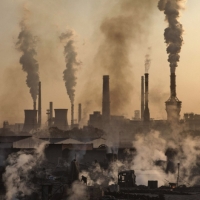India lowers emissions by 33% over a 14-year period.
India
lowers emissions by 33% over a 14-year period.
India has made notable
strides toward fulfilling its pledge to lower its carbon footprint over the
last 14 years. By 33% from 2005 to 2019, the nation's greenhouse gas emissions
rate was significantly lower. This
shows India's ability to adapt to greener energy options as well as its
dedication to international environmental initiatives.
dedication to the UNFCCC
The Scenario for
Current Energy
Green technologies and
the role of nature
Fossil Fuel Interactions
on a Global Scale
dedication to the UNFCCC
India's
commitment to the United Nations Framework Convention on Climate Change
(UNFCCC) serves as more evidence of its commitment to a sustainable future. The
country has committed to lowering its emissions intensity by 45% from 2005
levels by 2030. Particularly for the interventions implemented between 2016 and
2019, the average annual emission reduction rate of 3% was excellent.
The
Scenario for Current Energy
Even if progress is
being made toward a cleaner future, India's energy mix is still dominated by
fossil fuels. However, this source of energy is not the only one on which the
country depends. Non-fossil fuel-based energy, which includes sources like
hydro, nuclear, and renewable, contributed to 25.3% of India's
overall power generation in the fiscal year that ended in March.
Nevertheless, 73% of the used electricity is still provided by thermal power
plants, making them the dominant force..
Green
technologies and the role of nature
The carbon sequestration
process depends heavily on forests, which as of 2019 covered 24.56% of India's
territory.
India is pursuing novel energy options including green hydrogen, which is
created by using renewable energy to split water molecules, in addition to this
natural carbon sink.
Fossil
Fuel Interactions on a Global Scale
The use of fossil fuels
is still a sensitive issue on a worldwide basis. Two recent attempts by the
Group of 20 (G20), which is made up of the 20 largest economies in the world,
to come to an agreement on the phase-out of fossil fuels failed. These interactions
bring to light the difficulties in coordinating global energy transitions.
Know
More:
Read daily current affairs in English : Click Here
Read daily current affairs in Tamil : Click Here
Check the latest jobs update details : Click Here
Our
Achievements:
https://www.youtube.com/watch?v=MLRj6js0X5U
https://www.youtube.com/watch?v=ung7VREhwYI
Download
our Mobile Application: Android Mobile | IOS Mobiles
Our
Website's:
https://www.bestlearningcentre.in/
Office
Location:
https://goo.gl/maps/9JCNNv3HAkC4b92X7
For
any clarification, you may contact us at any time.
Educational
Counsellor: 7418968881
Customer
Support: 7418978881
Enrol
Now for Fresh Batch in UPSC | TNPSC | BANK | SSC | RRB | POLICE | TNTET | CTET
| NDA| CDS | AFCAT | DEFENCE | TANCET | CAT | MAT | ZAT EXAMS.
Call
Admission Desk: 7418968881
Book
Free Demo Class Now !
Batches
available in ONLINE & OFFLINE
